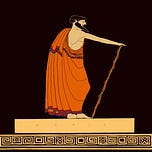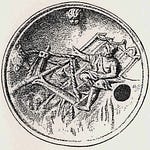Odyssey 4.1-154
Just like Helen, the fading beauty queen, there is a sense of expectations cheated as they’re met, of things being cut down to size in the same breath that they are exalted. Menelaus is supposed to be fabulously wealthy, at least in local terms. His house positively gleams. Nestor had attempted to fob his visitors off on Menelaus, because, it would seem, he had rather more resources at his disposal for taking care of guests. After speaking at them all day, he somewhat rudely insists that they go on to Sparta. But when Mentor (Athena) and Telemachus actually head off to go sleep on board ship, Nestor protests rather too much, and boasts about his blankets and towels. Let us hope Athena’s late blessing brings some late prosperity to the old man, who came home in such a rush …
Menelaus himself boasts that there may be some other mortal could compete with his acquisitions, but Homer himself lets us know that the richest houses are in Egyptian Thebes, where in fact Menelaus and Helen have mooched their finest stuff. Menelaus was a traveller, all right, but not exactly the man who comes to know the cities and the thought of men (see line 3 of the Odyssey). No, he’s on a mission to accumulate their goods. The bounteous Libyan sheep, born horned, impress him because they erase a key difference between the rich and the poor: over there, the shepherd as well, not just the king, gets all the cheese, mutton and lovely milk he wants.
Meanwhile, Telemachus gawps and gapes at the shine of Menelaus’ precious metals, and thinks this must be what Zeus’s front room looks like. The boy’s naïveté contrasts with Menelaus’ worldliness, but both display aggrandisement and self-aggrandisement. One wonders what Homer is up to in shifting the perceived size of things as he changes the beholder’s eyes.
But Menelaus also is clearly racked with regret and loss. He’d keep a third (!) of his goods if he could get his dead friends back. I suspect we’re supposed to note such a valuation, as one does the ⅗ of a man from the U.S. constitution. Menelaus would never lose everything to get his friends back.
And out comes Helen. What a simply awful household. We get a starter course right away: Helen says, in her inimitable way, that all those men died for my sake, the bitch, in their brave little war. ‘Nah,’ says Menelaus (to paraphrase): ‘it was for me.’ I bet that sort of exchange gets old pretty fast. Doesn’t everything.
In Greek:














‘Out Comes Helen’: Homer in English